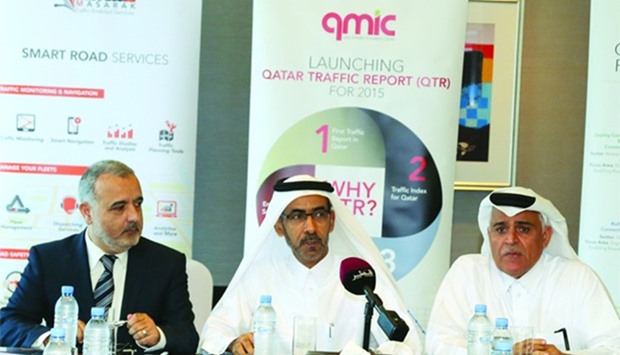“The first Qatar Traffic Report (QTR) has found out that each commuter spent on an average 102 extra hours due to congestion in 2015,” said Dr Adnan Abu Dayya, executive director, QMIC.
“We have reached on this figures based on analysing more than 50 million speed estimations in major road segments available in the Masarak Data Bank in 2015," he explained at a special event to announce the findings of the QTR.
Officials from the traffic department including Brig Mohamed al-Malki, secretary general of the National Traffic Safety Committee as well as a number of officials from various government organisations were present on the occasion. QMIC chairman Abdulla al-Talib, deputy CEO and chief commercial officer Abdulaziz Ahmed al-Khal and several senior officials also attended.
Data from the QTR has revealed a number of key insights about mobility in Qatar such as the congestion levels in peak hours, the most congested areas in the country and the months when the country had the most traffic congestion among others.
“QTR is the first national traffic report that could help ministries, national authorities, and the private enterprises in traffic studies, urban planning, and performance monitoring in the areas of transportation and road safety. It can help in assessing the impact of road or infrastructure projects on traffic over time; monitoring changes in congestion levels across Qatar; identifying problematic congestion areas in specific times and days as well as quantifying the economic and environmental impact of road congestion,” Dr Abu Dayya continued.
The official noted that QTR uses a number of key and globally accepted metrics to report on the severity, time, and locations of traffic congestion in Qatar. “The QTR introduces the concept of Masarak Congestion Index indicating average reduction in speed due to congestion and the travel time index that indicates the increase in travel time due to congestion to assess the level of road congestion.”
According to the official, QTR can be considered as a traffic index and a score card for Qatar over a period of time. He pointed out that having a traffic index for a country or a region is considered highly desirable and needed to measure and calibrate the road network, to set the right traffic policies and procedures, and to improve urban planning to ensure smoother traffic movement.
The QTR is one of the key outputs of the Masarak System which was fully developed and deployed by QMIC. Masarak represents a comprehensive platform and integrated suite of services serving the areas of Intelligent Transport, Road Safety, and Smart Logistics.
QMIC plans to issue updates to the QTR on a regular basis so that the mobility and congestion behaviour in Qatar can be properly tracked and assessed.

